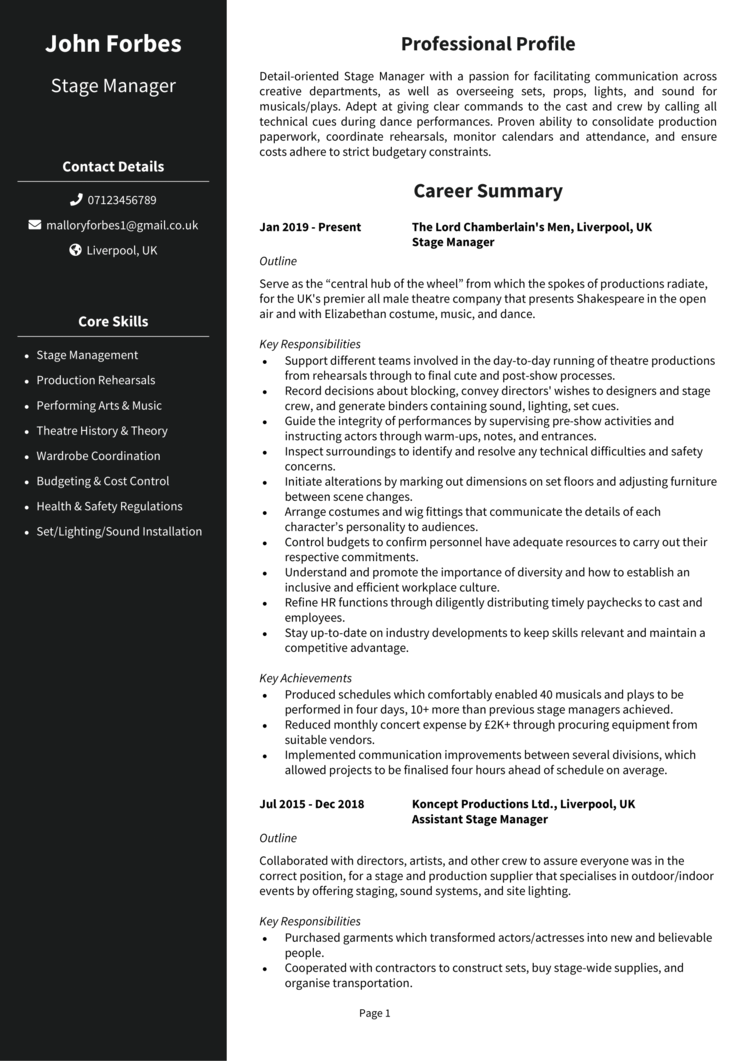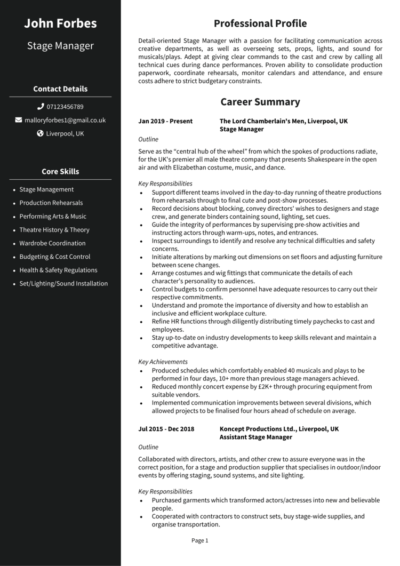Backstage chaos? Not on your watch. Whether it’s a local fringe show, or a West End spectacular, you’re the one making sure everything happens when it should – and nothing falls apart when it shouldn’t.
Your CV should reflect the same professionalism and precision you bring to every production. This guide will walk you through how to present your theatre experience, highlight the shows you’ve worked on, and prove you’re the person who keeps the curtain up and the cast calm – with a Stage Manager CV example to help you land your next big role.
Stage Manager CV sample

How to write your Stage Manager CV
Discover how to craft a winning Stage Manager CV that lands interviews with this simple step-by-step guide.
Running a show takes control and a sharp eye for detail – and so does writing a good CV. This guide will help you with writing a CV that captures your command of the rehearsal room and your ability to lead backstage teams.
You’ll learn how to present your CV the right way, and present your work in a way that speaks directly to creative teams.
Structuring and formatting your Stage Manager CV


Behind the curtain, nothing is left to chance – and your CV should reflect that. From props to people, you coordinate the chaos. A structured, effectively laid-out CV shows recruiters you’re just as meticulous on paper as you are backstage. Recruiters will appreciate a readable CV free from errors, so don’t frustrate them with an unnavigable mess.
Here’s the structure you should follow:
- Name and contact details – Start with your name and personal info – make it simple for recruiters to reach you. Including a photo is a personal choice.
- Profile – Use this section to summarise your experience, strengths, and what makes you a standout candidate.
- Core skills – Outline your primary competencies to give recruiters a snapshot of your strengths.
- Work experience – Walk through your professional experience, beginning with your latest position and moving backwards.
- Education – Outline your education and certifications, focusing on those most relevant to the role.
- Additional info – This section is optional, but it’s a good place for hobbies and interests that complement your CV.
Use bullet points when detailing each section of your CV, while making sure to stick to a clean font. Clear, bold section headings should be used to break up the format to ensure readability. Limit the CV length to two pages, which provides plenty of room to discuss your key qualities without boring the busy recruiter.
The best way to write a Stage Manager CV profile


Your CV profile is the first cue the reader gets – a quick overview of your backstage credentials and the kind of productions you specialise in. It’s more than just listing shows; it’s about showing the value you bring to a creative team and how you keep things running in high-pressure environments.
Since this is the first thing recruiters are going to see, you need to give a real sense of how you lead and how you support crews and casts alike. Demonstrate the value you’ll bring to any production.
Stage Manager CV profile examples
Profile 1
Experienced Stage Manager with over 10 years in live theatre, festivals, and touring productions. Skilled in coordinating rehearsals, managing backstage crews, and calling shows with precision. Proven track record of maintaining smooth performance operations under pressure in both large-scale and intimate venues.
Profile 2
Organised and adaptable Stage Manager with seven years of experience in community theatre and regional tours. Confident overseeing props, scheduling, cast logistics, and technical rehearsals. Known for excellent communication and calm leadership during show runs and changeovers.
Profile 3
Detail-oriented Stage Manager with five years of experience in fringe, student, and site-specific productions. Comfortable managing multiple departments, cueing complex shows, and working closely with directors and designers to bring creative visions to life.
Details to put in your Stage Manager CV profile
Make sure to cover the following:
- Where you worked – Outline the kinds of productions or organisations you’ve supported to give a sense of the environments and performance scales you’re experienced in.
- Your top qualifications – Mention your most relevant formal training or education to demonstrate your technical grounding and professional preparation.
- Essential skills – Summarise the practical backstage skills you bring, particularly those that show your ability to manage live performance environments with precision and control.
- Production types – Specify the general nature of the shows you’ve worked on so recruiters can understand the creative contexts you’re familiar with.
- Value delivered – Briefly explain the difference your stage management made – whether in terms of organisation, timing, safety, or team coordination.
How to present your core skills section properly


This section should reflect your real-world backstage skills – not just general strengths, but the actual systems, tools, and techniques you’ve mastered.
Stage Managers need technical ability and interpersonal precision. You should also mention your skills in ensuring health and safety compliance and or coordinating with departments. This section should reflect the job description closely – if they’re after cue-calling experience with QLab or experience with large ensemble casts, this is the place to prove you’ve got it.
Key skills that make a Stage Manager CV stand out
- Production Scheduling and Coordination – Creating detailed schedules for rehearsals, technical runs, and performances to keep the production on track.
- Backstage Crew Management – Leading and supervising backstage teams, including technicians, prop handlers, and dressers, during rehearsals and shows.
- Cue Calling and Show Control – Coordinating lighting, sound, and scene changes during performances by calling cues with precision and timing.
- Rehearsal Facilitation – Supporting directors and cast during rehearsals by organising scripts, taking notes, and managing time effectively.
- Set and Prop Oversight – Ensuring sets, props, and equipment are correctly placed, maintained, and available for each performance.
- Health and Safety Compliance – Enforcing safety protocols backstage and on set, including risk assessments and emergency preparedness.
- Prompt Book Maintenance – Compiling and updating the prompt book with all cues, blocking notes, and production details.
- Cast and Crew Communication – Acting as the central point of contact between directors, performers, designers, and technical staff.
- Problem Solving Under Pressure – Addressing last-minute issues quickly and calmly to ensure the show runs smoothly.
- Performance Report Writing – Documenting performance details, incidents, and crew notes to inform post-show evaluations and improvements.
How to present your work experience in your CV


This is the main stage of your CV. Your past productions and theatre roles show the breadth of your experience and the level at which you’ve worked. Be clear and results-focused – name the shows, the venues, the teams you managed, and the challenges you handled.
List your work experience in reverse chronological order. Start with a short summary of the show or company, followed by bullet points outlining your responsibilities and achievements.
Mention if you managed rehearsal scheduling, coordinated technical elements, oversaw get-ins and get-outs, or resolved emergencies mid-show: these are all things which hiring managers want from their recruits.
How should you list jobs on your Stage Manager CV?

- Outline – Summarise the type of production, scale of the company or tour, and who you reported to (e.g. director, producer, or production manager).
- Responsibilities – Use action words like “coordinated” and “called.” For example: “coordinated rehearsals for a 30-person cast” or “called lighting and sound cues during 8-week run at regional theatre.” Mention production types, safety responsibilities, and tech processes.
- Achievements – Show your impact: smooth show runs, accident-free performances, improved rehearsal processes, or managing complex cue sequences under pressure.
Work history examples for Stage Managers
Stage Manager | The Holloway Playhouse
Outline
Managed all stage operations for a five-week run of a contemporary theatre production at a 300-seat venue, coordinating with cast, creatives, and technical teams.
Responsibilities
- Scheduled and ran rehearsals, distributing daily calls and production notes
- Oversaw props, costume tracking, and scene transitions during performances
- Called lighting, sound, and automation cues from prompt script
- Maintained rehearsal reports and show documentation
- Managed backstage crew and ensured health and safety protocols were followed
Achievements
- Delivered all 28 shows without technical faults or missed cues
- Praised by director and cast for calm, clear communication during tech week
- Successfully integrated a mid-run cast change without impacting show quality
Stage Manager | Lantern Touring Company
Outline
Coordinated stage management for a regional theatre tour across 12 UK venues, adapting operations to each location’s technical setup and supporting a team of five.
Responsibilities
- Led fit-ups and get-outs at each venue and maintained touring inventory
- Managed prop packing, transport logistics, and daily venue communication
- Updated cue sheets and adapted blocking to accommodate new stage layouts
- Liaised with venue tech teams and maintained consistent performance standards
- Supported actors with wardrobe and scheduling during travel and show days
Achievements
- Completed tour with zero missed cues or performance disruptions
- Saved 15% on transport costs by re-optimising prop packing system
- Maintained high crew morale and strong venue feedback across tour
Stage Manager | Brighton Youth Theatre Collective
Outline
Oversaw stage management for two youth theatre productions per year, supporting performers aged 14–18 and delivering shows at community venues and festivals.
Responsibilities
- Ran technical rehearsals and managed communications between director and cast
- Organised prop sourcing and maintained inventory throughout show run
- Ensured young performers followed safety protocols and backstage procedures
- Assisted with set transitions, sound playback, and front-of-house coordination
- Documented show notes and managed post-show debriefs
Achievements
- Increased rehearsal attendance through improved schedule planning
- Helped secure festival invitation by ensuring strong technical delivery
- Recognised for mentoring junior volunteers and student ASM trainees
Presenting your education history


While theatre is often about experience, formal training still carries weight – especially for larger venues or union-affiliated productions. Education also shows that you’ve had structured learning in production processes and health & safety.
List your degree, diploma, or training chronologically, starting with the most recent. That could include a BA in Stage Management, an HND in Technical Theatre, or short courses which prove your abilities.
Best qualifications for a Stage Manager
- BA (Hons) Stage Management or Technical Theatre – A well-respected foundation for those working in professional productions
- Level 3 Diploma in Production Arts (UAL or equivalent) – Popular route into stage and production careers, especially for younger or emerging professionals
- First Aid at Work Certification – Often required on larger productions and essential for safety
- Manual Handling or Working at Height Training – Key for those supervising technical and crew operations
- Health & Safety for Theatre Practitioners (IOSH or similar) – Demonstrates readiness to lead safe, compliant productions





